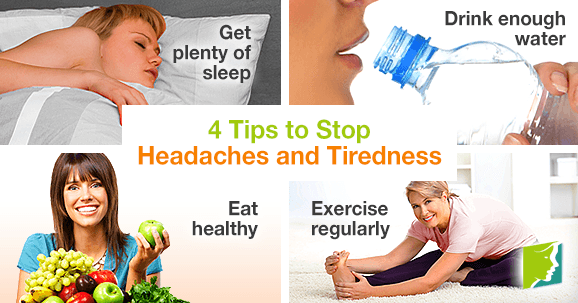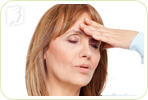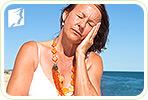Almost everyone experiences occasional headaches and tiredness to some degree. The experience of headaches can range from dull, nagging pain to unbearable migraines. Tiredness can range from mild fatigue to the severe tiredness that interferes with work, health, and overall life quality. Fortunately, there are several simple solutions to this problem. Keep reading to find out more about the causes of headaches and tiredness, as well as their respective solutions.
Get Plenty of Sleep
This seems like an obvious solution, but many people do not get sufficient sleep due to stress, poor diet, or lack of exercise. This is a primary cause for headaches and tiredness experienced throughout the day. If you have trouble falling asleep, here are a few tips for getting a good night's rest.
Taking a warm bath before bed helps the body relax and release any tension built up throughout the day. Listening to relaxing music while doing this may also help. As alcohol acts as a sedative, avoiding it may seem to be odd advice - but drinking alcohol before bed actually causes you to sleep less deeply. One glass of wine at night is fine, but any more than that may interfere with natural rest. Reducing stress is easier said than done, but incorporating simple practices into your nightly routine can help. For example, reading, meditation, or breathing exercises performed before bed may help relax and clear a restless mind.
Drink Enough Water
Dehydration is a leading cause of headaches and tiredness. Like lack of sleep it depletes energy levels and impairs general physical performance. Increasing water intake throughout the day can help boost energy levels and reduce headache frequency and intensity. An easy way to discover whether you are dehydrated is to check your urine color- it should be a pale yellow, anything darker than this indicates dehydration.
Exercise Regularly
Exercise is a great energy booster and stress reliever that also improves the efficiency of the heart, lungs, and muscles. The recommended amount of exercise is 30 minutes of aerobic activity five days a week. This includes anything from walking to jogging, cycling to yoga. If you do not currently exercise regularly, it is wise to start out small and build up to the recommended amount. Getting regular exercise will also help you to get better and deeper sleep.
Eat Properly
Eating balanced meals and healthy snacks every 3 to 4 hours is recommended for optimal performance and energy. Eating healthily will also combat headaches, as one of their main triggers is low blood sugar. Studies have shown that eating smaller, more frequent meals is better for you than eating big, heavy meals three times a day. An ideal healthy meal includes all of the food groups. Healthy snacks include fruit, nuts, or granola bars.
Headaches and tiredness are an almost inevitable part of life, but incorporating these simple tips into your daily routine can help alleviate these irritating problems. It is vitally important to get plenty of sleep, drink adequate amounts of water, exercise regularly, and eat properly to maintain a healthy lifestyle and avoid headaches and tiredness.
Sources
- Gil-MartÍnez, A. et al. (2013). [Therapeutic exercise as treatment for migraine and tension-type headaches: a systematic review of randomised clinical trials]. Revista de neurología, 57(10), 433-443. Retrieved from http://www.ncbi.nlm.nih.gov/pubmed/24203665
- National Health Service UK. (2013). Self-help tips to fight fatigue. Retrieved July 14, 2014 from http://www.nhs.uk/Livewell/tiredness-and-fatigue/Pages/self-help-energy-tips.aspx
- National Institutes of Health. (2013). Headache: MedlinePlus Medical Encyclopedia. Retrieved July 14, 2014, from http://www.nlm.nih.gov/medlineplus/ency/article/003024.htm




